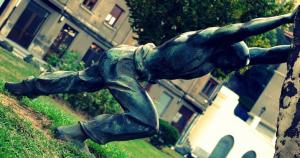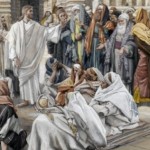 Matthew 6:24-34
Matthew 6:24-34
“You cannot serve two masters.”
You’ve heard the saying, from the old Westerns: “This town ain’t big enough for the both of us.”
Well, your life ain’t big enough for 2 opposing masters.
You cannot serve both God and wealth, and you cannot serve both God and self.
So who’s your master? Who are you really serving?
You have 3 choices on your menu today.
- serve self and put faith in self = pride
- serve wealth and put trust in possessions = idolatry
- serve God and put trust in Him = faith
Let’s begin with the worst choice of all, and the most common one: to serve self. Left to ourselves, this is our default mode of existence. Without divine intervention, this is how you will choose to live. Never mind that God has created, sustained, and redeemed every part of your life. Never mind that there is nothing you have that you have not received as a gift.
Where God says I AM, pride says, “No, i am!” (Pride actually shouts this at the top of his lungs, but coming from such a puny creature, it’s a little like Horton Hears a Hoo.)
The bad news is that it’s entirely possible to end up in pride without intending to, and there are many species of pride. Not all are as defiant and in your face as the most notorious ones. It’s as easy as the following scenario, which I’ll bet is painfully familiar to all of us. You receive God’s good gifts and are blessed by them. You are jubilant and thankful for a little while. You go on your merry way, now that you’re feeling pretty good. You allow yourself the illusion that things just happen or that they happen because you have made them turn out so well. You begin to trust in yourself and live by your own power.
Congratulations! You are now officially proud. Though this isn’t the worst kind of pride, pride it is.
In a surprising way, worry is related to Pride. We sometimes think that worry is a natural human emotion that can’t be helped or that it’s only human and logical to worry when there is trouble in life. But Pride is a master of disguise. Sometimes he’s rather clumsy and is like Inspector Clouseau trying to disguise his identity with a beard and glasses. Other times, he’s as subtle as his master.
But worry is a form of pride because it puts self in charge. It’s not the bombastic kind of pride that swaggers into a room and acts like it owns the place, but it’s still pride because it puts trust in self above trust in God. Worry cannot be the same as concern or godly action, and so we have to distinguish the two. One of Pride’s tricks is to masquerade as one of God’s good gifts: it’s a trick it learned from its master who can only imitate God’s good creation since he’s not very creative himself.
To worry is to be anxious about my ability to provide things for myself. Worry, therefore, is ultimately about who is in control. Though it might seem like a little thing, Jesus commands us not to worry 5 times in the short time we are spending with Him today. To all who are anxious and worried this morning, over anything; to all who are tempted to turn to self instead of God for what you need; Jesus says to you: “Do not worry about your life. You cannot add a day to your life, and you can’t provide for yourself without Me. But come to Me with humility, and I will provide for you everything you truly need.”
“Let me worry about what you need to wear, what you need to eat, and where you need to live. If I know how to take care of the grass and the lilies, and the birds, don’t you think I know how to give you all you truly need? Stop playing God for a moment, and I will be your God and provide all you need.”
As bad as trusting in ourselves is, it never stops there. When pride enters in, we begin to put our trust in the possessions God has given us, that yes, we have worked for, but that still belong to God. It’s all too natural to transfer the goodness and providence of God to His creation and to say, not that “God has given me this or will give me this” but that some material thing will give me this. At some point we find ourselves believing that the source of our strength and security and life is something other than God: money, a house, a job, another person, our selves. This is such a real danger that Jesus spends a lot of time talking about it. The funny thing is that at a time when we have more possessions and riches than any people who have ever existed before, our fear of not having what we need and our idolatry is greater than that of many people who have less.
How do you know when you are in danger of trusting in your possessions instead of God?
Here are some frank questions you need to ask yourself regularly:
- Do I trust in money or my house or any possession to provide my physical needs and give me security? Do I fear that I will lose them?
- How much time do I spend complaining about not having what I want?
- Do I trust in money or movies or cars or books or any physical possession to make me happy?
- Have I begun to believe that I am blessed because I have certain things that are good – rather than believing I am blessed because God has given me good things?
- Do I value myself, my sense of worth, and others based on material things?
- How much time do you spend thinking about getting the next possession, how it will feel,
and how you’ll plot and work to get it?
- Am I tithing? If not, what things that are not truly essential have I bought before I gave God what is due to Him?
I find that this last question is the one that most dramatically convicts us of our idolatry.
Do your possessions possess you? Like any disease, whether of the body or soul, there are symptoms and warning signs of the idolatry of trusting in Mammon. The questions I asked earlier are a good place to start
Jesus says that the most important symptom of serving Mammon and not God is worry – not just being anxious about having, but being overly concerned to have more and keep what I have more than what is necessary. Why do we worry? Fear that something bad will happen. Fear based on uncertainty. Fear that we will not get what we feel we are owed. But worry means trusting in a false god that cannot help you. We have a good reason to “worry” if we make our sense of worth, our happiness, or our well-being based on material things. Most tragically, worry means not trusting in the only one who can help you: God.
To all who are anxious or trust too much in money or possessions, Jesus says: “Do not worry about how much I have or have not given you. I am your treasure, and I am your security. The birds are beautiful and elegant and do not have bank accounts to trust in. Yet I give them all that they need. Do not worry or be anxious, for I am your true possession, and I am where true riches are to be found.”
Pride and Idolatry are terrible, deadly diseases. Thank God, there is a cure! You can’t solve worry or pride or coveting merely by desiring it. You can’t solve worry or pride or idolatry or covetousness by working harder or setting higher goals or by turning to yourself in any way. Dealing with sin is not a self-help project!
The antidote for the poison of sin, which is the poison of self, is God. Seek God first and His kingdom, and then the worry goes away. Why? Because God is the true source of all good things, all comforts, and all satisfaction. In pleasing Him, you can be assured that He will bless you in better ways than you could ever bless yourself.
Part of seeking God and part of the cure for being discontent and covetous or worrying is simply to give thanks. I believe that for every sin we commit there is a fruit of the Spirit that is the antidote. By giving thanks for what you do have, you do 2 things that are very pleasing to God. First, you acknowledge that He is the one who gave you what you have – and not you yourself. Second, you show that you are content and grateful, and not complaining. In being thankful for whatever you do have and not complaining or worrying about what you don’t have, you are showing God that you trust Him to give you all that you truly need.
But this thanksgiving must be shown by actually giving back the good things God has given: time, gifts, talents, money, and lives. We can go a step further and say: if you seek God, you will be thankful and content, and you will not worry or be proud or idolatrous or covetous. And you will be generous with God’s gifts.
Once again, the way to combat sin is not to turn to self but to turn to God. Seek God, and keep a vision of Him before you every day. Learn to live in His presence every moment. And pride and worry and idolatry will flee. And God Himself will make your life a heaven by coming to live with You again.
Prayer: Almighty God, Father of all mercies, we thine unworthy servants do give thee most humble and hearty thanks for all thy goodness and loving-kindness to us and to all men. We bless thee for our creation, preservation, and all the blessings of this life; but above all for thine inestimable love in the redemption of the world by our Lord Jesus Christ, for the means of grace, and for the hope of glory. And we beseech thee, give us that due sense of all thy mercies, that our hearts may be unfeignedly thankful, and that we show forth thy praise, not only with our lips, but in our lives; by giving up ourselves to thy service, and by walking before thee in holiness and righteousness all our days; through Jesus Christ our Lord, to whom with thee and the Holy Ghost be all honor and glory, world without end. Amen.
Point for Meditation: Make a list of things you have been worrying about or coveting or lusting after or acting proudly in. Then, make a list of all the good things God has already given you. As you compare the two lists, use them as a means to provoke you to give up your worry and idolatry and pride and to give thanks and seek God instead. It would be a good idea, as you list each way you have worried or coveted or been proud, to replace each of these with a reason to be thankful and trustful.
Resolution: I resolve to meditate on the ways in which I have been trusting myself instead of God. I further resolve to confess my sins and to turn to God and give thanks.
© 2015 Fr. Charles Erlandson











